By: Marie-Alix Depuydt
Over 200 gangs operate in Haiti. 95 of which in Port-au-Prince, the capital. In the past five years, the territorial control by gangs has increased, leading them to become mercenary partners to politicians and wealthy coordinators. Gangs now control over 60% of the capital’s territory, which will keep increasing due to the sense of impunity these gangs gave and the country’s growing poverty. President Moise’s death led to the fall of the political regime in July 2021, leading to the accelerated deterioration of living standards and basic human rights for the entire population.
Gangs have taken this period of economic and political instability as an opportunity to grasp control of economic sectors through kidnapping, raiding businesses, stealing food, and recently taking over the largest fuel terminal. The gang’s control has led to food, clean water, education, fuel, and health care blockades. With limited access to safe drinking water and a lack of hospital services, cholera has taken over the country, and the 1.8 million suffering from severe malnutrition are at an even greater risk of death. The past outbreak in 2010 lasted nine years, and NGOs fear that history may repeat itself if the global community takes no immediate action to end the food and water shortages, provide cholera vaccines and prevent loss of life. Due to the lack of basic human needs, this human rights crisis must be resolved and called upon by international actors shortly; otherwise, the situation will escalate.
Furthermore, Haitians live in constant fear, insecurity, and life-or-death situations. Rape, kidnapping, or killings have become the new weapon for gangs and a manner of punishment and suppression. These have displaced over 96 thousand Haitians and created a humanitarian and human rights crisis that deepens daily. In the capital, “¼ of girls and ⅕ of boys have been sexually abused” [UN, 2022], leaving them traumatized. Little seems to be done, as justice is often out of reach for victims, and no repercussions are faced by the perpetrators due to the poorly equipped and failing justice department. This systematic rupture and violation of human rights deteriorate all fundamental liberties in Haiti. International recognition of this sexual violence needs to occur, and help needs to be given to ensure the functioning of the justice system through greater security.
Human rights should be entitled to all human beings by virtue of their humanity, without discrimination; however, as described above, this is not the case in Haiti due to worsened liberty and security, rising levels of torture/cruel and degrading treatment, and lack of access to basic necessities. This civil crisis demands international justice and intervention to help protect the lives of Haitians. If left unchecked, the authority of the territory [gangs] will spiral out of control and leave thousands further devastated by the intensely fragile social Haitian society for generations to come. It will also make resolution and peace building virtually impossible. Overall, if no or limited action occurs, social and economic development will be undermined, and lasting stability will be unlikely.
For more information:
https://globalinitiative.net/analysis/haiti-gangs-organized-crime/

